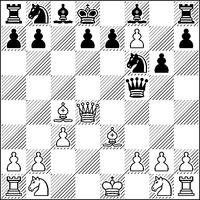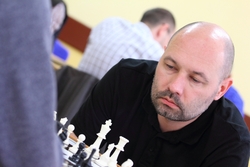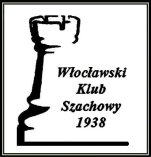
Włocławek revisited
Three years ago I went to Włocławek, a city not far from my home Toruń, for a rapid tournament, one of the local Grand Prix series. Neither the tournament nor my modest 50% performance were anything to crow about, so upon leaving, I was pretty sure that my first tourney in Włocławek would be also the last, until two months later I read an announcement of another rapid tournament, Wakacje w Starej Remizie (Holidays in the Old Firehouse). Interested in an unusual name, I decided to give it a go. The Old Firehouse in Włocławek turned out to be an actual old firehouse housing the local cultural centre. I still remember how delighted I was when I entered the assembly hall (Sala Zebrań) of the building for the first time to see the gigantic (8 by 2.5 meters) painting Wyjazd do pożaru (Fire call) by Józef Bergman. As a matter of fact, the decor of the spacious assembly hall, with its tapestries, paintings, pillars and a small balcony over the main entrance appeals to me still, after all the tournaments I played there, as does the building itself (a beautiful collage depicting Żabia street in our times and in the early 20th century, with the Old Firehouse visible, can be found here). Again, I didn’t perform well during the first tourney there, but this time the genius loci and, what’s more important, the atmosphere created by the local players, did their share, so when in April 2012 I received an invitation to the fourth classification tournament of the “WKSz 1938” chess club, I accepted it immediately. The old firehouse building undergoing renovation, we played in hospitable premises of the local Gallery of the Contemporary Art.
The Włocławski Klub Szachowy (WKSz) 1938 chess club was founded in 2010 and since that time has been continually presided by Paweł Grochowalski. Its name commemorates the first chess club in Włocławek, established in 1938. The club is very active: apart from meetings held twice a week and at least three classic 3-day tournaments a year they organize local championships in four categories, as well as a host of other rapid and blitz events. I took part in no less than ten of them, gathering enough of material to select something to share here.
In one of my first games played in Włocławek, playing black, in the following position I played Rxc3??, overlooking the simple pin:
Blunder was obvious, situation unenviable, I didn’t lose my spirits, though. 27.bxc3 Qc6 28.cxb4 Qxa4 29.Rb2 Qa1+ 30.Kh2 b6 31.Ra2 Qb1 32.bxa5 bxa5 33.Qxa5 Rc1 34.Nh4 Rh1+ 35.Kg3 Qd3+ 36.f3 followed, after which I made another dubious move, Qxd4. My opponent countered with Qd5+, I secured the king with Kh7, and then received a gift of Qd6??, after which g5 39.Nf5 exf5 40.e6 Qh4# sealed White’s fate.
In another game, playing white, I definitely overestimated the strength of my pawn structure in the middlegame, and allowed the following position to arise:
Black duly took the pawn with Nxc5 and after 33.Ne2 Ne6 34.Rg1 Nf4 35.Rhg3 Nxe2 36.Kxe2 Rb8 37.Rc1 c5 38.Ke3 b4 39.a4 b3 40.Rc4 a5 41.Rh3 Kf7 42.f4? it seemed that my position collapsed. In the next move Black blundered with exf4+??, though, to which I responded with nearly equally suboptimal Rxf4?. 44.Kxf4 Rb4+ 45.Ke3 Rxa4 followed, after which I gave my opponent another gift with f4?? (obviously black queenside pawns posed the real threat, and my f pawn had no perspectives whatsoever, so Kd2 was needed). Again, I thought myself lost, but after 46... d5 47.Rh2 Kf6 48.Rf2 Kf5 49.Rg2 Rxf4 I noticed that Rg5+ can be played, so the tables turned. Black resigned after 50... Kf6 51.Kxf4 c4 52.dxc4 dxc4 53.Rc5 a4 54.Rxc4.
Two months later, playing black, I reached the following position, in which I found a quiet little move which practically guaranteed my victory. Try to find it, too:
The next game shows my strange trait of playing better after losing a knight (which showed also during the first game presented here). Playing black against one of the strongest local players, I allowed White to promote the d pawn, after which the sacrifice proved necessary:
Strangely as it seems, though, the lost of the horsey didn’t reduce my hopes for a positive outcome of the game. 42.Rxd8 Ra2 43.Rd7 f5 44.gxf5 gxf5 45.Rd5 Rxa4 46.Nxa5 Kxf3 followed and suddenly it was White who defended themselves. Of course, the threat lacked tangibility, but after my precise play (47.Rxf5+ Kg4 48.Rb5 Kxh4 49.Kf2 Ra3 50.Nb3 Kg4 51.Rb4+ Kg5 52.Kg3 h5 53.Rb5+ Kg6 54.Kf4 Ra4+ 55.Kf3 Ra3 56.Kf4 Ra4+ 57.Kg3 Ra3 58.Kh2 Ra2+ 59.Kh1 Rb2) a draw was agreed in the following position:
Of course, many times I was at the receiving end of my opponents’ moves. One of these games is picturesque enough to be shown here. Three weeks ago, playing black against a much lower rated competitor, I recklessly allowed the following position to arise after only ten moves of play:
My opponent didn’t miss his chance, putting the finishing touch to the game with beautiful 11. Qb6+!! Chapeau bas!
Regardless of the score, though, it is always nice to attend tournaments held in the Old Firehouse. Members of the local club have the unique ability to create the atmosphere of its own — warm, cheerful, making every visitor feel at home right after entering the club premises. In case I failed to mention it earlier, many of them play very solid chess, too. It would be good to be able to compete for them in the local chess league; unfortunately, though, the WKSz admits only local residents, so I sometimes regret that I don’t live in Włocławek.




